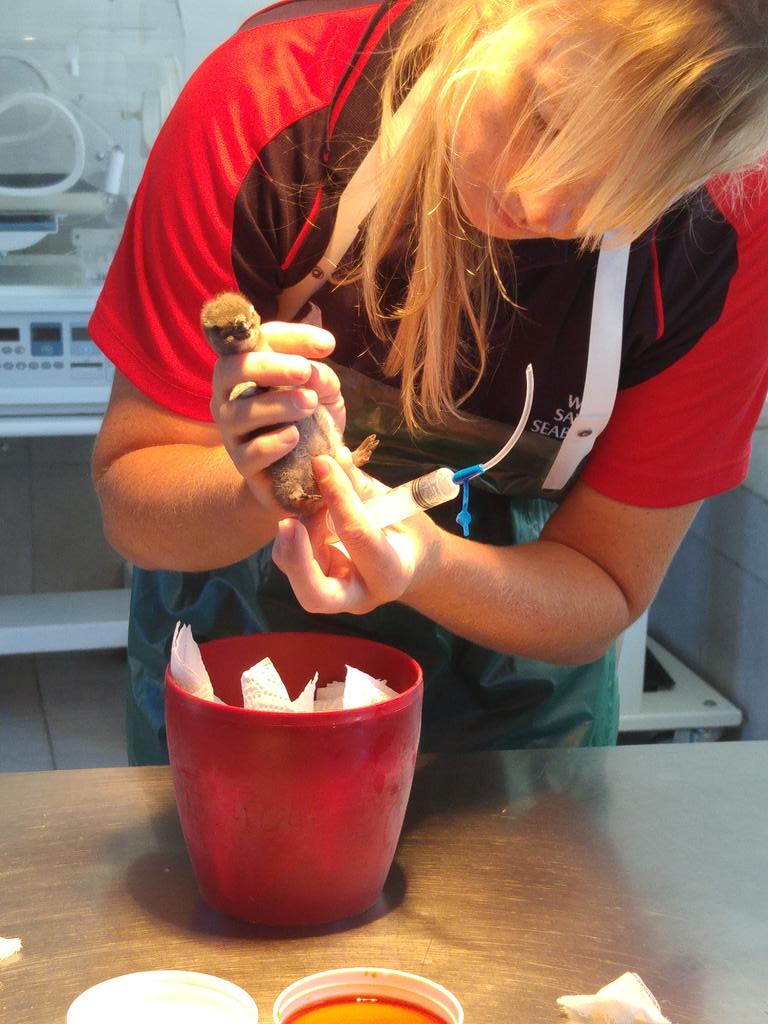Sunday 28 February 2016
Berenice Moss
Baby Penguins are being taken care of at SANCCOB in Cape Town.(Twitter@BereniceMoss)
 A special group of Penguin babies are receiving extra special
treatment at the Southern African Foundation for the Conservation of
Coastal Birds (SANCCOB) in Cape Town.
A special group of Penguin babies are receiving extra special
treatment at the Southern African Foundation for the Conservation of
Coastal Birds (SANCCOB) in Cape Town. The Non-Governmental Organisation's African Penguin chick season has begun and the first of 31 eggs have hatched.
Pushed to the brink of extinction, each bird is invaluable. The eggs were taken from nests built outside the protected area of the Boulders Beach breeding colony at Simons Town.
Thus far three have hatched and the staff is keeping a close eye on them. The chick rearing unit is a sterile environment where the chicks are housed in incubators exactly like the ones used for new born babies. The chicks weigh between 66 and 85 grams.
They are fed six times a day with a special formula made up of blended fish, water and a variety of vitamins.
Supervisor at the facility Romy Klusener prepares the special meals for the chicks. It is no easy task, special care and patience is required as the chicks can get infections. She uses a syringe to feed them and during this time also cleans the umbilical areas.
"It is a very tedious job and we are here at 0530 in the morning with these chicks. Their first feed is at 6 in the morning and our last feed is at 9 at night; so it is a really long day but it is all for a good cause," says Klusener.
The African penguins are an endangered species
Over the past 10 years SANCCOB has successfully released almost 4 000 penguin chicks into the wild. Klusener says research has shown that the hand reared chicks at the facility fared just as well as the wild birds raised by their parents.
"The African penguins are an endangered species and the chick rearing unit is part of the CBP which is your chick bolstering project which was established in 2006 and this is to help with the drastic decline in the African penguins’ population in the wild. We sitting at 2% of what we used to be 80 years ago , we were sitting at a much higher rate so we have 2% left of our total population, it has gotten to the point where every bird counts. The chick bolstering project and the chick rearing unit, we take eggs and abandoned chicks from the wild we hand raise them and place them back in the wild."
The cost of raising and rehabilitating the endangered species does not come cheap. Klusener says they need all the help they can get. "We rely on donations, it does not matter how big or small, every bit counts. We also run an adoption special, you don’t unfortunately get the penguin but the money is used to run the facility and the rehabilitation process. So you get a nice adoption pack and a picture of your penguin and a little note saying thank you for the adoption and we also open for tours 365 days a year."
Healthy penguins breed up to three times a year and with 28 more eggs at the facility, the staff at SANCCOB could soon have their hands full raising these waddling wanders.
source







No comments:
Post a Comment